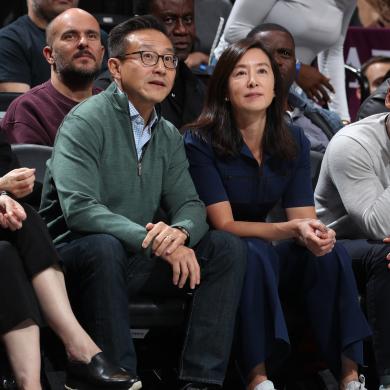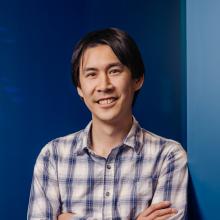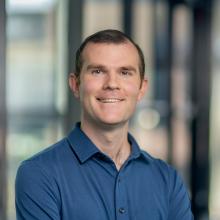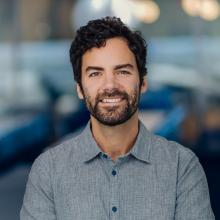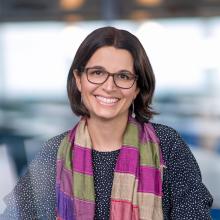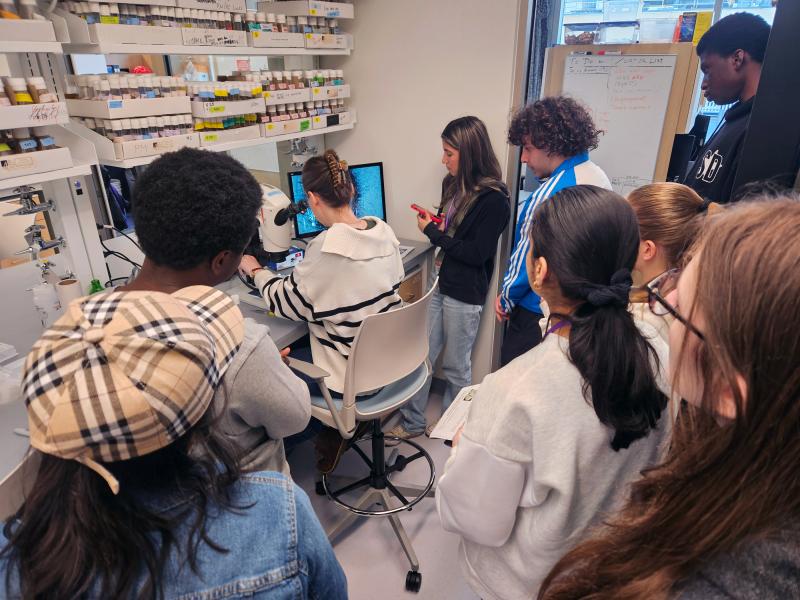Year in Review
Highlights from the past year at the Wu Tsai Institute, spanning July 2024 to June 2025
-
Centers
-
Grand Challenges
-
Humans
-
Activities
-
Community Engagement
-
Media
The Institute stimulated team science, supported new fellows, and expanded education and training. Nearly 200 faculty members and their research groups spread across more than 30 departments published over 500 peer-reviewed articles.
Engage with us as we continue our journey to know, together.

Centers
Through interdisciplinary events and shared research facilities, the Institute’s three centers supported community and science.
Center for Neurocognition and Behavior
The Center's facility for human brain imaging, BrainWorks, saw 4,628 hours of equipment usage and offered over 140 training sessions for 22 labs across 11 departments. BrainWorks also inaugurated its first immersive research spaces: the Igloo CAVE provides a large and fully controllable immersive space for creating 3-D spatial experiences of sights and sounds while tracking eye and body movements, while the omnidirectional Infinadeck treadmill plus VR goggles allows study participants to walk naturally while navigating virtual environments.
These resources can be combined with wearable neurotechnologies offered by the Center to measure brain activity or physiological body signals. In addition, the Center opened six group cognitive testing stations for running behavioral computer tasks in parallel.
The Center hosted a faculty recruitment symposium, "Interactive Systems in Cognition." Its hallmark weekly seminar series, Projects in Progress or PiPs, continued to provide a community-building forum for new project ideas, methodological workshops, and outside experts.
New efforts to build a central database of research participants through fliers, social media, and engagement with the Yale Peabody Museum were successful, resulting in hundreds of study sessions at BrainWorks.
Finally, the Center established an advisory group to bring together colleagues with complementary expertise to advise BrainWorks on serving the broad community effectively.



Research highlights from Center faculty
Hal Blumenfeld's research group in NeuroImage
Elizabeth Goldfarb’s research group in Learning and Memory
Julia Leonard's and Samuel McDougle's research groups in Cognition
Brian Scholl’s research group in PNAS
Center for Neurocomputation and Machine Intelligence
The Center's high-performance computing cluster, Misha, received new high-end H200, H100, and L40 GPU nodes, doubling its GPU processing capabilities. The number of users more than doubled over the year, with over 300 accounts currently registered. These accounts come from over 30 PI groups from across the Yale School of Medicine, Faculty of Arts and Sciences, and School of Engineering and Applied Sciences.
The Center hosted a faculty recruitment symposium, "Computation and Cognition," as well as a postdoc recruitment symposium, "New Minds in Computation and Cognition." Tutorials on best practices and efficient use of high-performance computing environments benefited researchers across campus.
The Center sponsored a biweekly journal club on NeuroAI, organized by faculty and trainees and, on occasion, featuring outside speakers.
Undergraduate students developed projects to improve the accessibility of the Center's facilities, including a VR/AR framework for data exploration and an enhanced user portal for Misha.
Finally, the Center established an advisory group to provide guidance on continuing to grow support for computational research on cognition at Yale.



Research highlights from Center faculty
James Duncan’s research group in Medical Image Analysis
Christopher Lynn and colleagues in Physical Review E
Ilker Yildirim’s and John Lafferty’s research groups in Nature Human Behaviour
Center for Neuroplasticity and Development
The Center's shared research facility for advanced commercial instruments, NeuroLux, marked the installation of its first microscope—a superresolution confocal Abberior MIRAVA Polyscope. The Center's facility for research and development of new technologies, The Plexus, completed its build-out of the optical lab and provided specialized support for new faculty to accelerate their transition to Yale.
The Center organized a series of pop-up installations and workshops by instrument manufacturers so that users could test the capabilities of new imaging equipment under consideration for future expansion of the facilities.
Electron microscopy researchers at the Center met regularly to share their latest findings, troubleshoot technical issues, and explore potential collaborations.
The Center had the honor of hosting a visit by Nobel Prize winner Dr. Stefan Hell from the Max Planck Institute.
Finally, the Center established an advisory group with members to provide guidance and recommendations on microscopy initiatives to drive cutting-edge imaging research.



Research highlights from Center faculty
Michael Crair’s and Liang Liang’s research groups in Science
Pietro De Camilli’s research group in Current Biology
George Dragoi’s research group in Nature Neuroscience
James Noonan’s research group in Cell
Grand Challenges in Cognition
We launched a coordinated team-science effort to address fundamental challenges on the critical path to understanding cognition. Challenge 1, Foundation Models of the Brain, seeks to leverage the revolutionary advances in AI for language and vision to train a foundation model of the brain from neural and behavioral data across methods, scales, and species. If successful, this model could help reveal core principles of cognition and could be fine-tuned to translate data between modalities and to generate hypotheses for experimental validation.
Led by Associate Director John Lafferty and the Center for Neurocomputation and Machine Intelligence, the challenge was developed by an engaged group of 30 faculty and 50 trainees across 17 events last year. Researchers from data science, computer science, biomedical engineering, psychology, and neuroscience coalesced around three areas: data, to gather existing and new datasets for model training; informatics, to create a software platform to share and retrieve AI-ready data; and modeling, to adapt existing models and build new ones. They solicited feedback on ideas during a workshop and industry roundtable. The resulting team-science project commenced in summer 2025.
Challenge 2, Cognition in the Wild, is being led by Associate Director Kia Nobre and the Center for Neurocognition and Behavior. The topic was workshopped in WTI's annual conference, on the theme of Embodied and Embedded Brains. Speakers and participants explored how brain activity and behavior are shaped by body functions, physical environments, and social contexts—and what might be missed in traditional, laboratory-bound experiments. The goal is to understand how cognition operates in the real world, and how new sensing and wearable technologies may open new avenues to discovery. The topic and interested researchers will explore and refine Challenge 2 in the coming year.



Humans
Welcoming junior faculty
Harry McNamara, Assistant Professor in the Department of Molecular, Cellular, and Developmental Biology, joined the Institute and established his lab in the Center for Neurodevelopment and Plasticity. He applies his background in physics to study synthetic biological systems called organoids in order to reveal how the brain self-organizes in development. With support from the Institute, Tyler Brooke-Wilson joined the Department of Philosophy and Center for Neurocomputation and Machine Intelligence. His research combines cognitive and computational sciences to better understand human and artificial intelligence.
The Institute helped departments recruit several additional assistant professors to Yale last year: Dan Levenstein in the Department of Neuroscience is a computational neuroscientist combining neurobiology with AI; Alex Lew in the Department of Computer Science is an expert in probabilistic programming and deep learning; and Lauren Whitehurst in the Department of Psychology and Black Studies is a cognitive neuroscientist who studies the impact of sleep, and sleep disparities, on learning and memory.
These faculty join a growing cohort of Wu Tsai Investigators, a special program for junior faculty hired in partnership with the Institute whose research significantly advances the Institute’s mission.
Training the next generation
10 Postdoctoral Fellows, 19 Graduate Fellows, and 12 Undergraduate Fellows contributed to the dynamic, boundary-crossing research of the Institute.
In partnership with the Yale Graduate School of Arts and Sciences, we developed a Certificate in Brains, Minds, and Machines to expand graduate education and training opportunities. The Certificate allows students from any PhD program across Yale to pursue cross-disciplinary coursework and hands-on training in biological, psychological, and computational approaches to understanding cognition. The first cohort of certificate students will begin in Fall 2026.
Postdocs
We welcomed three new Wu Tsai Postdoctoral Fellows who mix experimental, computational, or theoretical methods to pursue interdisciplinary research across traditional disciplinary boundaries:
Abigail Hickok, Computational Postdoc Fellow
Mentor: John Lafferty
Felicia Hardi, Experimental Postdoc Fellow
Mentors: Elizabeth Goldfarb, Dylan Gee
Reagan Lamb, Experimental Postdoc Fellow
Mentors: Marc Hammarlund, Joerg Bewersdorf
A number of Fellows advanced in their careers, including Jacob Miller who joined the University of Miami as an Assistant Professor in the Department of Psychology and Rahul Singh who joined the University of Rhode Island as an Assistant Professor in the Department of Electrical, Computer, and Biomedical Engineering.


Research highlights from postdoctoral fellows
Wu Tsai Postdoctoral Fellow Josue Caro in Nature Machine Intelligence
Wu Tsai Postdoctoral Fellow Jacob Miller in Nature Reviews Neuroscience
Wu Tsai Postdoctoral Fellow Rahul Singh in Frontiers in Psychology
Students
The arrival of four new Wu Tsai Graduate Fellows enriched connections across a range of doctoral programs, including neuroscience, linguistics, statistics and data science, biomedical engineering, physics, and psychology.
This summer, 11 Wu Tsai Undergraduate Fellows from Yale College conducted research projects spanning neuroscience, biology, psychology, linguistics, and computer science. Additionally, one undergraduate and two graduate students from the University of Puerto Rico, Río Piedras participated in the 10-week program, bringing new perspectives that enhanced the collaborative research community.


Research highlights from graduate students
Graduate Students Erica Busch and May Conley in Biological Psychiatry: CNNI
Wu Tsai Graduate Fellow Gloria Feng in Nature Communications
Wu Tsai Graduate Fellow Rosa Grijalva in PNAS
Graduate student Gustavo Madeira Santana in Science
Graduate student Tristan Yates in Science
Activities
The Institute hosted 570 large gatherings in its event spaces for mission-aligned courses, workshops, seminars, and conferences run by the Institute, its close departments, and groups across campus. More than 300 hosted coffee hours attracted over 32,000 visitors to mingle and spark collaborations.



Seminars
The flagship, biweekly Inspiring Speakers Series featured 13 talks from nationally and internationally recognized speakers. These visitors enriched the scientific dialogue through their talks, time with trainees, and meetings with faculty across campus. The series is the cornerstone of the Institute’s newly launched YouTube channel, which is developing into a robust repository of scientific content from a range of disciplines.


Student, Postbac, and Postdoc Collective (SPPC)
WTI’s Student, Postbac, and Postdoc Collective (SPPC) ran a dozen research, professional, social, and community events. For example, in "Level Up Your Science Talk," advanced graduate students gave a workshop for trainees on how to communicate science by breaking down complex ideas, connecting with the audience, and making presentations more compelling. The largest event of the year was the annual "Sips and Science" at a local restaurant, which featured six talks and 42 New Haven pizzas.
Applied Philosophy in Neuroscience (APHINE)
Trainees and faculty gathered to bridge philosophy and neuroscience through activities organized by the student-led group Applied Philosophy In Neuroscience (APHINE). Through weekly journal clubs, a guest lecture series, and a day-long workshop they explored the cognition of AI, perception of time, and measurements in neuroscience.
Community Engagement
Mind/Matter at the Yale Peabody Museum
Combining science, history, and art, the exhibition Mind/Matter: The Neuroscience of Perception, Attention, and Memory at the Yale Peabody Museum playfully engaged visitors as they explored the human element in how science is conducted and how discoveries are made. A section about early life memories engaged visitors who filled out over 55,000 cards documenting their first memories. The exhibition was curated by Associate Director Daniel Colón-Ramos in collaboration with numerous faculty at Yale.
Neuroscience and Cognition Bootcamp
Local high school students gave up their spring break to join a three-day intensive program at the Institute to learn about cutting-edge research on the human brain. Run by the Student, Postbac, and Postdoc Collective, Bootcamp participants learned directly from Yale scientists as they visited WTI’s research facilities, observed live demonstrations, and worked in teams on their own projects using research data. At the conclusion of the bootcamp, students presented their findings and received a certificate of completion.
Yale Brain Education Day
Nearly 90 local middle schoolers attended the annual graduate student-led event for students to explore the brain with Yale scientists, run in partnership with Yale Pathways to Science. One of the main stops of the day was touring BrainWorks in WTI’s Center for Neurocognition and Behavior. Students rotated among various research instruments including M/EEG, fMRI and fNIRS, and witnessed brain-computer interfaces, seeing up close state-of-the-art research tools.
Seeds of Success
Dozens of New Haven middle schoolers gathered at the Institute for a day of science exploration and empowerment. Students toured BrainWorks and the Colón-Ramos lab, participated in hands-on activities and demonstrations by graduate students, and heard inspiring advice from Yale faculty members. The visit was part of Seeds of Success, an NIH-funded education project for sixth to eighth grade girls in New Haven who want to explore science, technology, engineering, math, and medicine.
2025 Artist-in-residence: Sigune Hamann
Visual artist Sigune Hamann explored perception and embodied experiences during her residency by bringing artistic and scientific approaches into direct exchange. Using experimental photography, videography, and wearable brain research technologies, she explored perception as both subject and method. Hamann developed and presented her work in collaboration with the Yale University Art Gallery, the Center for Collaborative Arts and Media, and the Yale Center for British Art.
Media
October 16, 2024
In a Q&A with YaleNews, Tyler Brooke-Wilson discusses how studying AI can reveal new insights into how the brain works, and why he wanted to explore these questions at Yale.
December 2, 2024
The New Yorker profiled Wu Tsai Faculty Member Laurie Paul, whose work explores how transformative experiences can reshape what we know and who we are. Paul challenges conventional decision-making frameworks, asking, "To whom should we have allegiance—the self making the choice, or the self who will be changed by it?"
December 10, 2024
Debunking the myth that only one figure was right in this storied tale of neuroscience history, Associate Director Daniel Colón-Ramos reflects in The Transmitter on curating an exhibition about the brain and the process of science for a wide audience.
April 18, 2025
Yale Engineering magazine highlighted Wu Tsai Investigator Cristina Rodríguez's custom-built microscopes that revealed the existence of temperature-sensitive neurons in regions never before observed, advancing our understanding of how the nervous system encodes sensory input.
May 29, 2025
Wu Tsai Investigator Shreya Saxena talked to Yale Engineering magazine about building biologically inspired AI models to decode how the brain controls movement with an aim of understanding how we move, think, and perform by reverse-engineering the brain's sensorimotor loop.
Acknowledgements
We are grateful to Clara Wu Tsai and Joseph C. Tsai, Esq., '86, '90 J.D., for their transformational gift to establish the Wu Tsai Institute and for their ongoing support.
We also thank the following individuals and organizations for their generous support this year: Sandra '96 LAW and Hugh '96 LAW Lawson; Susannah and Jim Adelson P'20 through the Susannah and Jim Adelson Endowment for Brain Research; GG Technologies and chief executive officer, Wei Huang, through the GG Technologies Resource Fund for Human Brain Decoding.
